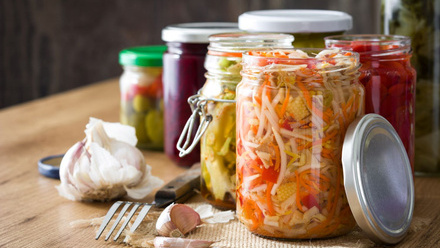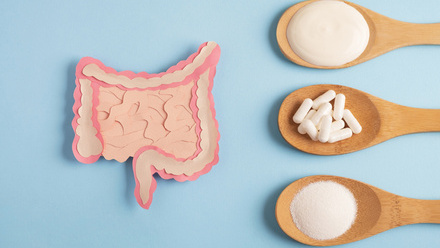My journey to becoming a gut health expert
Freelance dietitian Jo Cunningham explains why optimising gut health should be on the agenda for every dietitian seeing clients.
How did you become a gut specialist dietitian?
I started my career as an accountant, working in various industries for 10 years. It was after I saw a ‘nutritionist’ and was sold those pesky food intolerance tests that I started to get interested in nutrition.
I quickly found out that those tests aren’t valid and my research led me to discover dietetics as the gold standard in nutritional care. I knew this was what I wanted to do. All throughout my dietetics degree, I was interested in IBS management as I wanted to improve my own digestive discomforts.
After working in a private oncology hospital on Harley Street for a number of years and supporting patients with their digestive side effects from treatment, it became clear to me that looking after our digestive system is so crucial to our overall health and happiness. During the pandemic, I went freelance and was lucky enough to secure a contract working as the Clinical Director at The Gut Health Clinic, where my clinical knowledge in gut health exploded thanks to the wonderful team there.
Currently I’m working at WellConnect Coaching where, with my business partners, we coach nutrition professionals who want to build/scale their own businesses. As we’ve got working knowledge of the nutrition industry, as well as our previous careers in accounting, marketing and business coaching, we are well qualified to support sustainable business growth. We launched a podcast this year called Nutrition Business Secrets which I’m really enjoying, and I’m excited about where it’s going to take our business.
Alongside this, for the past nine months I’ve also been working at building my own clinic, Green Light Nutrition. My team of dietitians and I support clients with digestive disorders, as well as with those living with cancer. I’m also on the Clinical Advisory Committee and act as Lead Dietitian at Perci Health, an online cancer support platform.
Why is it important to look after your gut health?
Many dietitians reading this may already be aware of the American Gut Project, which released a key study five years ago which showed that eating 30 or more plants per week leads to more diversity with the gut microbiome vs those who have 10 plants per week.
This study sparked huge interest and trends around improving gut health and incorporating more plants into the diet. This is so exciting, especially when you think of how outdated and limiting the 5 A Day message is, which only refers to fruits and vegetables instead of all our plant foods.
Our gut microbiota not only help us digest our food, but they have also been linked to reduced inflammation, supporting the immune system, heart health, brain health, hormone regulation, and even protection against chronic conditions and certain cancers, as well as how we may even respond to certain cancer treatments. It makes total sense, therefore, that we should be supporting these wonderful microbes by feeding them well so that they can look after us.
How can a dietitian help optimise gut health?
Dietitians support clients with a wide range of clinical conditions, and as there are links between our gut microbiome and every organ of the body, optimising gut health should be on the agenda for every dietitian seeing clients. Of course, there may be immediate more pressing nutritional areas which the dietitian needs to address, but I think we should all be talking with our clients about longer-term plans to look after our gut microbiota where it’s appropriate to.

In my clinic I don’t just get people’s IBS symptoms improved and then discharge them; I coach clients to expand their diet alongside dietary and lifestyle IBS strategies. With our cancer clients, if we’re not getting on top of side effects from treatment, we’re often talking about how a varied plant-based diet can support their immune health and reduce inflammation during treatment and beyond. Where possible, within my clinical practice as well as in my health promotion work, I incorporate gut health optimisation.
What are the challenges of incorporating more plant foods into the diet?
This of course varies depending on the client’s personal circumstances. For many individuals, when they increase their plant intake suddenly that’s when the gut gets a bit ‘shocked’ which can increase digestive symptoms such as bloating. The key is usually to make slow and gradual changes over time.
For many of my IBS clients, we have to take into account that they often have dietary triggers which are usually from plant foods. I tend to avoid the low- FODMAP diet unless I absolutely have to because of its restrictive nature. I focus instead on expanding the diet to include 30 or more plants, using mostly low-FODMAP foods to begin with to help them naturally space FODMAPs out whilst incorporating other strategies to help reduce that visceral hypersensitivity and improve stool consistency and frequency.
I’ve found this approach to be well received and usually very successful. For my cancer clients, often reduced appetite and taste changes can make it difficult to achieve good plant diversity. I usually talk about ways to make food more tasty using herbs and spices which count towards our overall plant intake.
Top tips for optimising gut health
- Include one to two portions of fermented foods like yoghurt, kefir, sauerkraut and kimchi into your diet at least once per week, if you like them.
- Deviate from traditional recipes – consider adding beans, lentils, courgette, carrot, peppers, kohlrabi and spinach/kale/spring greens to a bolognese sauce or stew.
- Bring back the side salad. Do this at home to add some extra plants to the plate such as mixed salad leaves, olives, different coloured peppers, beetroot and edamame beans.
- Don’t forget the nuts and seeds — it’s easy to make a batch of granola that includes at least seven different nuts and seeds to start the day off well.
- Rotate the grains. Aim for seeded, whole grainbreads but don’t be afraid to try others (rye, sourdough, spelt). Try alternative grain pastas —there’s some great brands out there who make lentil, green pea, chickpea and mixed grain pastas which taste really good. And don’t forget other grains like quinoa, buckwheat and millet. Recipe ideas are plentiful online, so get experimenting!







